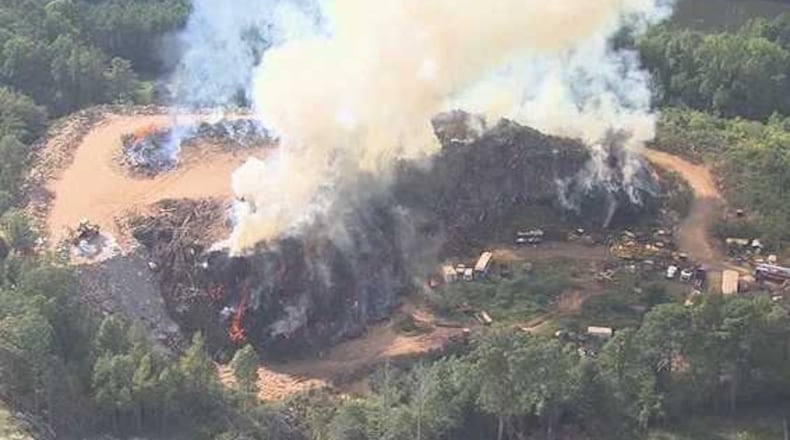A man who let a unlicensed landfill burn in a South Fulton neighborhood for eight months has been fined $1 million.
Tandy Ross Bullock, whose attorney was not immediately available for comment, was found to have violated the Georgia Comprehensive Solid Waste Act, court records show. The total fine is $1,084,550 and he must remove all waste from the six-acre site within 120 days, a state court said. Bullock must also install measures to prevent sediment from leaving the site within four weeks and create a storm water pollution prevention plan within six weeks.
It isn’t clear how the fire started, but 60-foot-high smoldering mountains of debris belched smoke and chemicals into the quiet Bishop Road neighborhood about 13 miles southwest of Hartsfield-Jackson International Airport.
READ | Catch up with the story by clicking here.
“It’s a good thing that somebody is holding him accountable for his actions or inactions,” said 56-year-old Gina Yielding, who lives a half-mile from the landfill. “It’s a matter of seeing if they ever receive that money.”
Of the hefty fine, the judge’s decision said “the appropriate penalty should stress the seriousness of the violations, including the extended history of non-compliance.”
On Wednesday afternoon, The Atlanta Journal-Constitution asked the state Environmental Protection Division what would happen if Bullock can’t pay or misses clean-up deadlines, but agency spokesman Kevin Chambers said he wasn’t able to answer those questions before press time.
Chambers said Bullock has 30 days to file an appeal, which would be heard in Fulton County Superior Court.
Bullock has been arrested three times in connection with the fire. But the arrests, fines and scrutiny come after more than a decade of authorities knowing about the unlicensed landfill and only taking its most serious action when the problem caught fire.
Fulton County received complaints starting in 2007 about Bullock running a landfill without a permit and issued a citation against him. Bullock didn’t stop, and the piles became unstable. The EPD first struck a deal with Bullock to reduce the amount of solid waste on the property in 2013, according to a court filing.
The EPD visited the site 40 times between June 2017 and April 2019 to document the growing mounds, according to the court paperwork from Tuesday’s ruling.
Credit: ALYSSA POINTER/ALYSSA.POINTER@AJC.COM
Credit: ALYSSA POINTER/ALYSSA.POINTER@AJC.COM
The EPD estimates there was 450,000 cubic yards of construction and site preperation debris — concrete, rebar, stumps and the like — which is roughly enough to fill 45,000 large dump trucks.
The agency multiplied that number by Bullock’s going rate of $75 per load to determine he made about $3.5 million by collecting the waste.
IN OTHER NEWS | Lawsuit could unseat East Point councilman over old conviction
It isn't clear if that estimate is correct, but Bullock's attorney Charles Brant, previously told the AJC that it would have been tough for his client to pay back the $500,000 budgeted by the state for a contractor to put out the fire. The money was not spent because the fire, which burned from Sept. 20 to May 16, was finally extinguished by Bullock.
The state settled on the $1 million fine, but could have used a different calculation to put Bullock on the hook for about $50 million.
“A million dollars is not that great (an amount) when you’re talking about all of the individuals that it affected,” State Rep. Debra Bazemore, a Democrat and head of the South Fulton delegation, told the AJC.
Yielding and her neighbors are worried about their health.
“It is nice to know that there are things going on, and it might alleviate some of the anxiety among people,” Yielding said.
Follow The Atlanta Journal-Constitution on Facebook and Twitter
An air study from Environmental Protection Agency found there were no long-term health effects from exposure to the smoke, but it found worrisome levels of six chemicals, including benzene, formaldehyde and the industrial product phosgene — which, according to the Centers for Disease Control and Prevention, was a significant World War 1 chemical weapon.
Bazemore was relieved to hear about the court’s ruling, but fears the worst.
“Down the road, we might see that some people might say they were affected,” she said.
In other news...
About the Author
Keep Reading
The Latest
Featured




